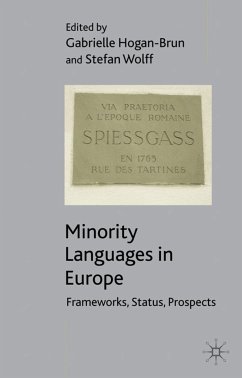Minority languages are part of Europe's shared cultural heritage and there is a broad consensus that it is important to protect and encourage linguistic and cultural diversity during the process of continuing European integration. But what legislative and policy instruments can be effective? Are there conflicts between language rights and the social policy demands of nation building? How are general European concerns reflected or challenged within individual countries? This volume illustrates the intellectually productive debate among sociolinguists, linguistic anthropologists, political scientists, lawyers, language activists and policy makers. The contributions focus on the current status of minority languages within a 'Europe of the regions', the future prospects for minority languages in the continuing process of European integration, and the effectiveness or otherwise of current national and European frameworks in ensuring future linguistic and cultural diversity.
Minority languages in Europe, as part of a common cultural heritage, need protection. The contributions to this book reflect urgent, stimulating and productive debates among researchers in sociolinguistics, linguistic anthropology, politics and sociology, and among language activists and policy makers. At the heart of the debate are the effectiveness of the existing political and legal frameworks aimed at protecting linguistic and cultural diversity, and prospects for the survival of minority languages in the process of European integration.
Minority languages in Europe, as part of a common cultural heritage, need protection. The contributions to this book reflect urgent, stimulating and productive debates among researchers in sociolinguistics, linguistic anthropology, politics and sociology, and among language activists and policy makers. At the heart of the debate are the effectiveness of the existing political and legal frameworks aimed at protecting linguistic and cultural diversity, and prospects for the survival of minority languages in the process of European integration.
'This book provides a highly useful interdisciplinary treatment of the challenges and opportunities confronting minority languages in Europe. Although problem spots change over time, some fundamental questions keep resurfacing, and the legal and institutional approaches in the first chapters of this volume offer a well-balanced introduction to essential aspects of minority language issues. The general papers are complemented by careful case studies, and this book is destined to remain a valuable resource for students and scholars in years to come.' - François Grin, University of Geneva
'Important reading for anyone interested in minority languages, in particular recent developments in Central Europe. The chapters in the book represent a good overview of the current debates on language rights, linguistic diversity and efforts at protection and promotion by international treaties and organizations. It is a rich and fascinating collection which adds a number of in-depth case-studies on German minorities, national minorities in the Baltic states and the Romani language. Those are minorities that have not received much attention in the literature thusfar and these contributions will not get outdated easily. The book sheds real light on issues of minority languages and language policy.' - Dr Durk Gorter, Ikerbasque research professor, University of the Basque Country
'This book is a...must...for those interested in multilingualism, language planning andlanguage policy, whether teachers, students, politicians and scholars in the field. I recommend Minority Languages in Europe not only because of its timeliness and relevance, but also because of its multidisciplinary approach to a better understanding of language conflicts in Europe.' - Professor Dr. Peter H. Nelde, Director of the Research Centre on Multilingualism, University of K.U.Brussels
'This is a timely work which contains a fascinating discussion of key areas in managing Europe's cultural and linguistic diversity. It may contribute in theoretical and empirical terms to a better understanding of the challenges facing the new Europe, and the legal and political imperatives for diversity.' - Dr Fernand De Varennes, Senior Lecturer, Murdoch University School of Law, Western Australia
'Important reading for anyone interested in minority languages, in particular recent developments in Central Europe. The chapters in the book represent a good overview of the current debates on language rights, linguistic diversity and efforts at protection and promotion by international treaties and organizations. It is a rich and fascinating collection which adds a number of in-depth case-studies on German minorities, national minorities in the Baltic states and the Romani language. Those are minorities that have not received much attention in the literature thusfar and these contributions will not get outdated easily. The book sheds real light on issues of minority languages and language policy.' - Dr Durk Gorter, Ikerbasque research professor, University of the Basque Country
'This book is a...must...for those interested in multilingualism, language planning andlanguage policy, whether teachers, students, politicians and scholars in the field. I recommend Minority Languages in Europe not only because of its timeliness and relevance, but also because of its multidisciplinary approach to a better understanding of language conflicts in Europe.' - Professor Dr. Peter H. Nelde, Director of the Research Centre on Multilingualism, University of K.U.Brussels
'This is a timely work which contains a fascinating discussion of key areas in managing Europe's cultural and linguistic diversity. It may contribute in theoretical and empirical terms to a better understanding of the challenges facing the new Europe, and the legal and political imperatives for diversity.' - Dr Fernand De Varennes, Senior Lecturer, Murdoch University School of Law, Western Australia








